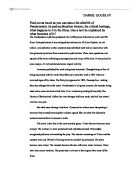Frankenstein contrasts his 'thirst for knowledge' with Elizabeth's interest in 'the aerial creations of the poets'.
Frankenstein contrasts his ‘thirst for knowledge’ with Elizabeth’s interest in ‘the aerial creations of the poets’.
What is your response to Shelley’s exploration in Frankenstein of the relative merits of science and literature?
Mary Shelley grounded her fiction of the scientist who created a monster he cannot control upon an extensive understanding of the most recent scientific developments during her days. She thereby initiated a new literary genre, what we now call science fiction. More importantly, she used this knowledge both to analyze and to criticize the more dangerous implications of the scientific method and its practical results. Implicitly she contrasted what she considered to be “good” science – the detailed and reverent description of the workings of nature- to what she considered “bad” science, the hubristic manipulation of the elemental forces of the nature to serve man’s private ends. In Frankenstein, she illustrated the potential evils of scientific hubris and at the same time challenged the cultural biases inherent in any conception of science. Victor Frankenstein chooses to work within the newly established field of chemical physiology. He must thus become familiar with the recent experiments in the disparate fields of biology, chemistry, mechanics, physics and medicine. The need to span the entire range of science is stressed by Frankenstein’s chemistry professor, M. Waldman, who observes that “a man would make but a very sorry chemist, if he attended to that department of human knowledge alone” and therefore advises Victor “to apply to every branch of natural philosophy, including mathematics”. At the University of Ingolstadt, Victor enrolls in courses in chemistry and natural philosophy, inspired by the charismatic M. Waldman. In the book, Shelley repeatedly depicts M. Waldman character as evil by using undignified terms, even when his intentions were good.







